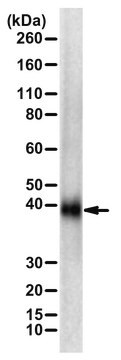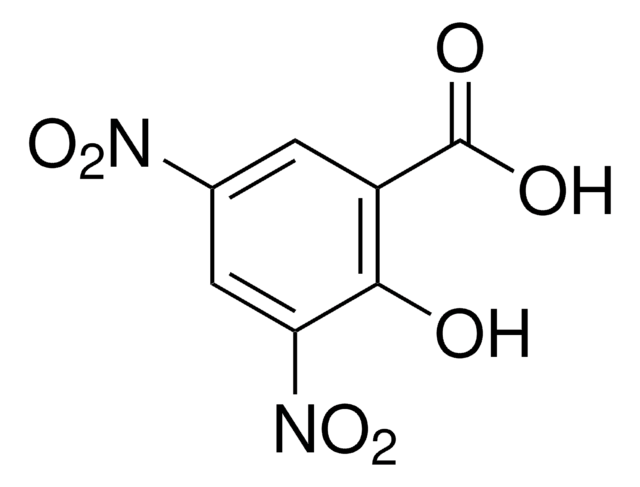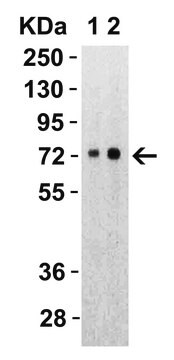MABF2815
Anti-SARS-CoV-2 Spike RBD Antibody, clone 6C2-G9
About This Item
Produtos recomendados
fonte biológica
mouse
Nível de qualidade
conjugado
unconjugated
forma do anticorpo
purified antibody
tipo de produto de anticorpo
primary antibodies
clone
6C2-G9, monoclonal
peso molecular
calculated mol wt 141.18 kDa
observed mol wt ~200 kDa
reatividade de espécies
virus
embalagem
antibody small pack of 100 μg
técnica(s)
ELISA: suitable
immunoprecipitation (IP): suitable
neutralization: suitable
western blot: suitable
Isotipo
IgG1
nº de adesão UniProt
Condições de expedição
dry ice
temperatura de armazenamento
-10 to -25°C
modificação pós-traducional do alvo
unmodified
Descrição geral
Especificidade
Imunogênio
Aplicação
Evaluated by Western Blotting in lysate from HEK293T cells expressing full-length spike protein of SARS-CoV-2 virus.
Western Blotting Analysis (WB): A 1:1,000 dilution of this antibody detected Spike glycoprotein in HEK293T cells expressing full-length spike protein of SARS-CoV-2, but not in lysate from wild-type HEK293T cells.
Tested Applications
Neutralizing: A representative lot neutralized SARS-CoV-2 Spike protein RBD to ACE2 in Neutralizing applications (Courtesy of Kento Abe and Anne-Claude Gingras, Toronto).
ELISA Analysis: A 1:3 dilution from a representative lot detected SARS-CoV-2 Spike protein. (Courtesy of Stefan Schüchner, Ingrid Mudrak, Ingrid Frohner, and Egon Ogris (Max Perutz Labs, Medical University of Vienna, Austria).
Western Blotting Analysis: A 1:400 dilution from a representative lot detected Sars-CoV-2 Spike protein in Whole cell lysates of HEK293T cells expressing full-length spike protein of SARS-CoV-2. (Courtesy of Stefan Schüchner, Ingrid Mudrak, Ingrid Frohner, and Egon Ogris (Max Perutz Labs, Medical University of Vienna, Austria).
Neutralizing: A representative lot neutralized SARS-CoV-2 Spike protein RBD binding to ACE2 receptor. (Abe, K.T., et al. (2020). JCI Insight 5(19):e142362).
Immunoprecipitation Analysis: A representative lot immunoprecipitated SARS-CoV-2 Spike protein. (Courtesy of Stefan Schüchner, Ingrid Mudrak, Ingrid Frohner, and Egon Ogris (Max Perutz Labs, Medical University of Vienna, Austria).
Note: Actual optimal working dilutions must be determined by end user as specimens, and experimental conditions may vary with the end user
forma física
Armazenamento e estabilidade
Outras notas
Exoneração de responsabilidade
Não está encontrando o produto certo?
Experimente o nosso Ferramenta de seleção de produtos.
Código de classe de armazenamento
12 - Non Combustible Liquids
Classe de risco de água (WGK)
WGK 2
Ponto de fulgor (°F)
Not applicable
Ponto de fulgor (°C)
Not applicable
Certificados de análise (COA)
Busque Certificados de análise (COA) digitando o Número do Lote do produto. Os números de lote e remessa podem ser encontrados no rótulo de um produto após a palavra “Lot” ou “Batch”.
Já possui este produto?
Encontre a documentação dos produtos que você adquiriu recentemente na biblioteca de documentos.
Nossa equipe de cientistas tem experiência em todas as áreas de pesquisa, incluindo Life Sciences, ciência de materiais, síntese química, cromatografia, química analítica e muitas outras.
Entre em contato com a assistência técnica





